Let's be honest, having a mobile app is simply table stakes now. Your customers already expect one that works perfectly. They want speed, they want a smooth experience, and they absolutely demand that their data is handled securely. The entire business world is organizing itself around these digital tools, with a well-built app at the center, supported by the right Mobile App Development Services.
The real surprise for many leaders is just how intricate modern app development has become. This is not a simple project. You are launching a complex system that ties directly into your backend operations, influences every customer interaction, and dictates your strategic options for years. Getting the right development team accelerates your entire strategy. Choosing poorly, however, can stall your digital progress completely, especially when you plan to hire mobile app developers.
This guide walks you through the essential considerations before hiring a mobile app partner. We will look at technology choices, team structures, and the real cost drivers. Our goal is to help you ask the questions that actually matter, so you can find a team that builds a true business asset. This becomes even more helpful as you assess how to choose a mobile app development company, understand how to hire mobile app developers, and get familiar with the typical mobile app development process steps.
Boost your understanding of the entire build process with our full range of Mobile App Development Services.
Why Mobile App Development Isn’t “Just an App” Anymore?
Apps today often learn and adapt using AI-driven personalization, all while demanding rigorous security and consistency across multiple platforms. This evolution completely redefines what you are hiring for. The focus shifts decisively from basic coding to a deeper, more strategic skillset that aligns with modern Mobile App Development Services. It requires:
Product thinking
Your teams need to aim for intentional architecture designs planned for scale and resilience from the very beginning, not one that just writes commands.
DevOps maturity
Foundational knowledge of DevOps maturity and security-by-design is not just a perk. It is a non-negotiable bedrock for any impactful application. It helps to earn user trust and survive in the wild.
Delivery management
The team must manage rapid delivery cycles and long-term lifecycle management. They should be as committed to the app's evolution after launch as they are to the initial build. This is especially crucial when you plan to hire mobile app developers who can support growth beyond the first release.
So you see, you are not just hiring someone to build a feature list. You are selecting a long-term partner for your digital business itself, ideally one experienced in Custom App Development, Android App Development, iOS App Development, or Hybrid App Development, depending on what you aim to build.
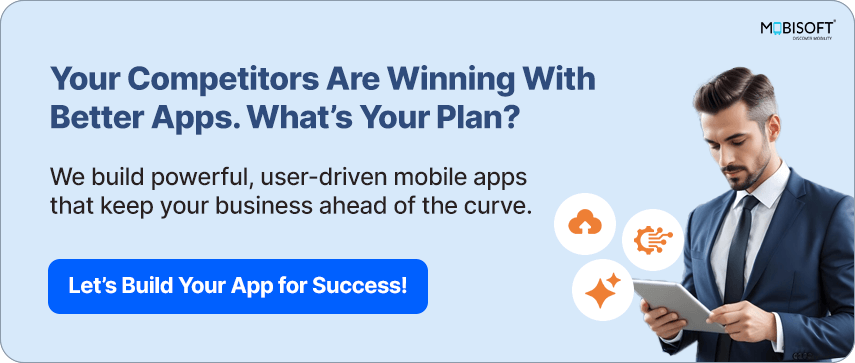
The Services a Truly Capable App Team Should Offer
Go through the whole range of services offered, with questions specific to your use case. This will help you partner with a firm that fits your needs as perfectly as possible and ensures you understand the key steps of the mobile app development process.
Core Development Approaches
Native App Development
Building specifically for iOS (Swift) or Android (Kotlin). This is your best bet when you need top performance, like for financial, healthcare, or gaming apps.
Building specifically for iOS (Swift) or Android (Kotlin). This is your best bet when you need top performance, like for financial, healthcare, or gaming apps, a common route in Android App Development.
Cross-Platform Development
Using tools like Flutter or React Native to build from a single codebase for both platforms. It’s a solid path to get a functional app to market faster and for less initial cost, especially for teams exploring Cross-Platform App Development.
Hybrid & PWA Development
Leveraging web technologies for budget-friendly or content-focused apps. A practical choice for certain business goals and often considered alongside Hybrid App Development options.
The Essential Support
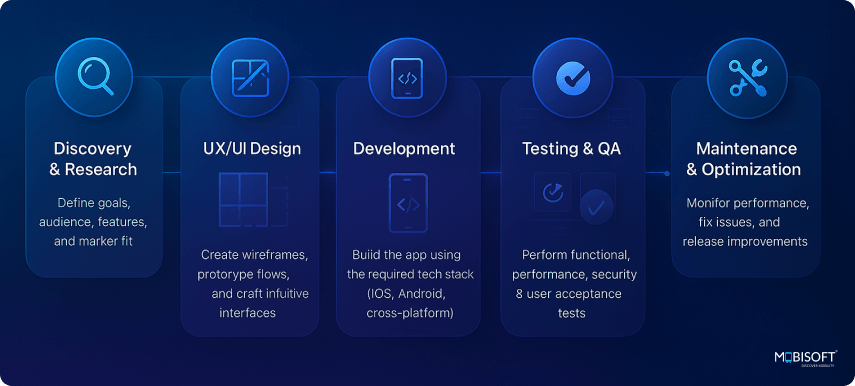
Your app is more than a front-end. Its backbone is just as critical.
Backend & API Development
This is the unseen engine. It manages user logins, keeps data consistent across devices, powers live features, and connects to your other crucial business software.
UI/UX Design
This is the full journey from rough sketches to interactive models. It's a craft that decides if your app feels intuitive and enjoyable, which is what makes people stick around.
QA & Test Automation
This is a meticulous process to catch bugs, check for security holes, and ensure speed. It's woven right into the build cycle to prevent problems from ever reaching your users.
Long-Term Product Strategy
App Modernization
This is the process of taking an old, slow app and breathing new life into it. It means updating the tech, refreshing the look, and most importantly, making it fast and functional again.
Support & Lifecycle Management
This is the continuous upkeep your app requires after it goes live. It's what keeps everything running smoothly, and frankly, it's the phase where most apps stumble without dedicated care.
Getting a handle on these services means you find a team that builds for the long run. You need a partner for the entire life of your app, not just the first day. Speed up your project execution with dedicated professionals from our Hire Mobile App Developers offering.
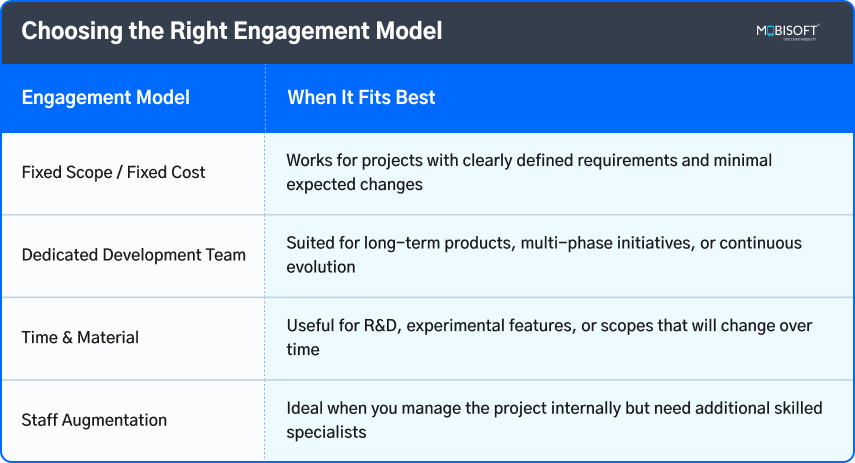
Key Questions Businesses Must Answer Before Hiring Any Team
What is the core business goal of the app?
Is your app purely meant to drive sales, or is it more about building a loyal community? You need to find that one impact you definitely want to see your app have on your business. Maybe it's just about automating one painfully manual process. Defining that single driving purpose initially is crucial. It will become a reference for every feature request in the future to be measured against, especially when planning Mobile App Development Services.
Which platforms matter most to your audience?
This isn't really about your personal preference. It's about where your customers actually spend their time. Do your analytics show they're mostly on iPhones? Or is your brand stronger in markets that lean heavily on Android? Committing to both is a bigger lift, of course. But getting this choice wrong means you might build something your audience can't even use, whether you choose iOS App Development, Android App Development, or Cross-Platform App Development.
How complex does the experience truly need to be?
We should be practical here. Does the first version really need that complex AI or a fully integrated wallet? Is offline mode just optional or a critical need? Every single "yes" here isn't just a feature. It's a whole new layer of work, testing, and potential headaches that can expand your Custom App Development requirements.
Are you building a one-off or a long-term asset?
Consider this a basic but important question. Are you creating an app just to check a box? Or are you making a digital footprint that can grow and adapt in the coming years? The way you answer this shapes everything. Your decision determines if you need a temporary coder or a committed partner to help plan for the future when you hire mobile app developers.
What is a realistic budget and timeline?
Have a candid, internal conversation about investment and time. It may even be just a rough range, but it is critical. It builds a foundation of trust with your partners from day one. It’s the best way to avoid those really difficult, finger-pointing meetings later on as you align your expectations with the mobile app development process steps.
Plan your budget strategically with insights from our Mobile App Development Cost guide.
What to Look for When Hiring a Mobile App Development Team?
Foundational Capabilities
This is the non-negotiable baseline every team must have.
Relevant Industry Experience
You need a team that's built apps in your world. They'll understand your compliance needs, your users' habits, and the unspoken challenges you face, especially when you rely on Mobile App Development Services tailored to your domain.
Strong Technical & Team Structure
Evaluate their core skills. Look for a mature DevOps pipeline and modern UI/UX practices. Can they navigate both native and cross-platform development? Is their cloud and API architecture robust? Dedicated roles like Product Managers, Backend Developers, QA, and Business Analysts are necessary, especially when the project may involve Android App Development, iOS App Development, or Cross-Platform App Development.
The Hallmarks of Strategic Execution
These are the qualities that turn a project into a lasting success.
A Culture of Design Excellence
First impressions are everything in the app store. A great team knows that stunning, intuitive UI/UX isn't a final step. It's a core principle that guides every decision from day one.
Forward-Looking Architecture Thinking
Ask them how they build for tomorrow. Their answer should include scalability, clean API structures, and modular code. You need a foundation that won't crumble when demand or features increase, particularly if your roadmap includes long-term Custom App Development enhancements.
The Partnership Mindset
This is how you'll work together, and it makes all the difference.
Clear Communication & Project Management
A great team operates with transparency. They use Agile practices, provide weekly demos, and maintain clear documentation. You should never feel in the dark about progress, risks, or dependencies when you hire mobile app developers for an extended engagement.
A Proven Ability to Scale
Your startup won't stay small forever. Your development partner shouldn't be either. As your user base and ambitions grow, their team and processes must be able to scale their efforts right alongside you, seamlessly.
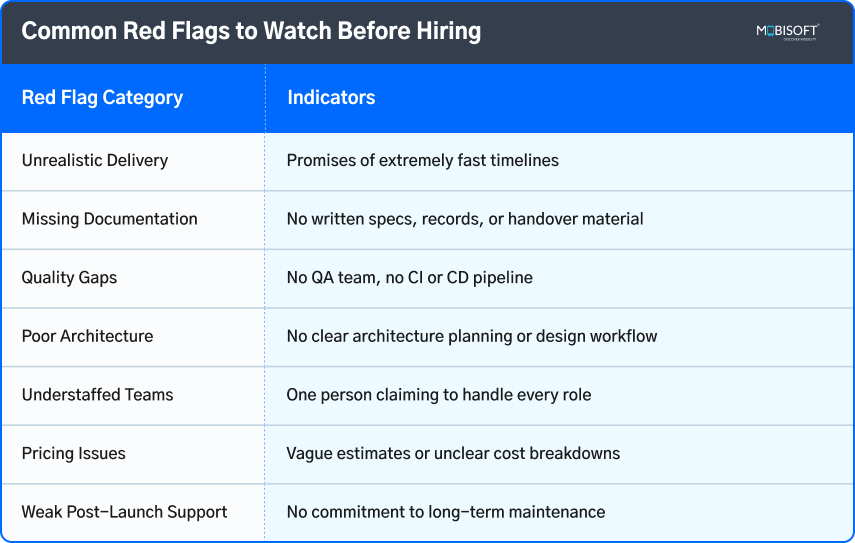
Choose the best platform approach for your business with our guide on Native vs Cross-Platform App Development
Essential Technical Questions to Ask a Vendor
These separate strong teams from mediocre ones and help you validate their understanding of the proper mobile app development process steps.
Architecture & Development
- What architecture do you recommend for our use case?
- How do you ensure high performance?
- How do you handle offline-first requirements?
- How do you structure APIs for scalability?
Security Compliance
- What security standards do you follow?
- How do you handle encryption?
- Do you use secure storage for credentials/tokens?
- How do you prevent OWASP top-10 vulnerabilities?
DevOps
- Do you use CI/CD?
- What is your deployment workflow?
- How do you monitor production performance?
QA
- What percentage of the process is automated testing?
- What testing tools do you use?
Support
- How quickly do you resolve production bugs?
- What is your escalation matrix?
Understanding Cost: What Really Influences Mobile App Development Pricing
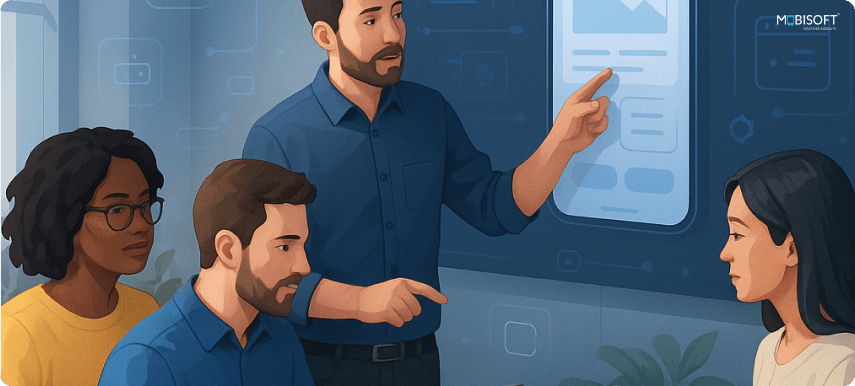
These factors heavily influence the overall cost. Understanding and planning accordingly becomes necessary when evaluating Mobile App Development Services:
Feature Complexity
What does your app actually do? A basic info app is straightforward. But real-time features, AI, or a marketplace? That’s a whole different level of effort and cost. Complexity is your biggest price factor and directly affects any effort put into Custom App Development.
Platform Count
This one's simple. Building for one platform costs less. Need both iOS and Android? That doubles the work, or nearly so. Your choice here directly shapes the initial investment required.
Design Complexity
Think about the feel. Custom animations and unique brand journeys need more designer time. A cleaner, standard interface is faster. This choice heavily influences your final bill and user perception.
Backend Requirements
This is the hidden engine. A simple data backend is manageable. But microservices, real-time engines, or heavy data processing? That’s a complex beast. It demands significant expertise and development time, becoming a major factor when you hire mobile app developers with backend specialization.
Third-Party Integrations
Services like Stripe, Twilio, Salesforce, etc, all add up another layer. Each one needs to be carefully built, tested, and maintained. More integrations mean more complexity and cost, without a doubt.
Cloud Infrastructure
Your app needs a home on AWS, Azure, or Google Cloud. These aren't one-time fees. You pay monthly for what you use, and costs scale with your traffic and data needs.
QA & Testing Depth
Skipping thorough testing is a gamble. A rigorous QA process finds bugs before your users do. It adds to the initial cost but saves you from expensive, embarrassing fixes later.
Support & Evolution
An app is a living product. After launch, it needs constant care: bug fixes, security patches, and new features. This ongoing investment is essential for its long-term survival, especially when planning future mobile app development process steps.
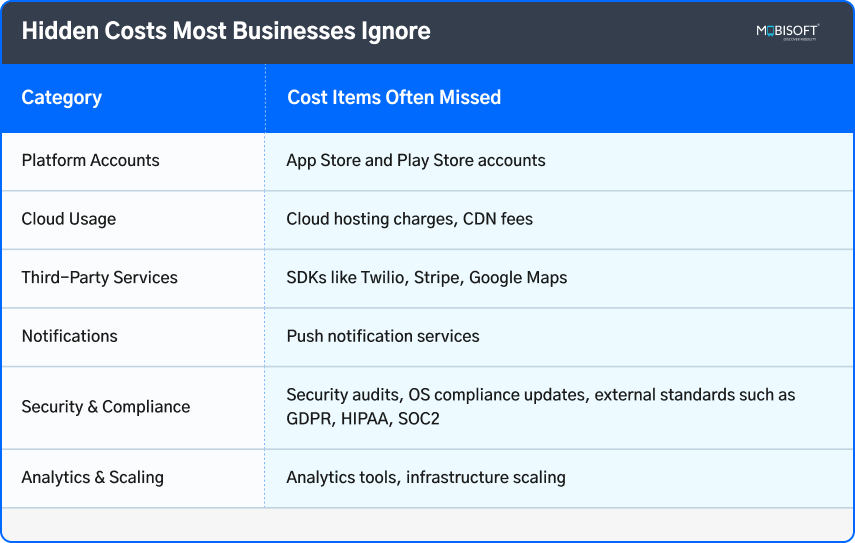
Build for every user segment with our specialized Android App Development.
How to Vet a Partner Beyond Their Portfolio
A portfolio only shows what a mobile app development company has delivered. How they operate behind the scenes remains invisible. Evaluate these areas before choosing your partner in mobile app development:
- Product Mindset: Look for a team that challenges your assumptions and prioritizes business outcomes.
- Technical Depth: Request a conversation with their lead architect to gauge their strategic depth.
- Delivery Process: Ask for samples of their project plans and user stories.
- Communication Culture: You need consistent transparency and responsiveness throughout your ecommerce app development services.
- References: Have real conversations with 2-3 of their previous clients.
Why Product Thinking Matters More Than Coding Skills
Follow this approach, and it will help turn your ideas into successful products, instead of just apps:
Understand user needs
This means going beyond a feature list. It’s about digging into the real problems your users face daily, the frustrations they can’t quite articulate. You have to uncover the job they need your app to do for them, something every strong mobile app development services partner focuses on.
Build user flows
Imagine this as charting the entire experience someone has while using your app. You are crafting a simple and sensible route they can follow, ensuring they finish their actions without feeling stuck or confused. This keeps them away from frustrating dead ends.
Create prototypes
Before a single line of code is written, build a clickable model. This tangible prototype lets you physically test and demonstrate the app’s flow. It’s the cheapest, fastest way to spot problems and validate your core assumptions with real people.
Structure an MVP
An MVP is about discipline. It’s the absolute smallest set of features needed to prove your core business idea works. This strategic focus helps you launch faster, learn from the market, and avoid building things nobody actually wants, essential before you hire mobile app developers for full-scale delivery.
Define your roadmap
This outlines your plan to shape the future. A strong roadmap helps decide what to create next using actual user feedback and business objectives. It works as a flexible guide to unite your team and steer how your product grows.
Run usability tests
This is where you watch real people use your app. You’ll see where they struggle, where they pause, and what they misunderstand. These observations are pure gold, giving you direct insight to refine and improve the experience before the final build, whether it’s Android app development, iOS app development, or hybrid app development.
Deliver seamless performance across Apple devices with our iOS App Development Services.
How AI Is Transforming Mobile App Development
Teams that understand AI can give your app an edge. A development partner with AI capability becomes a strategic advantage for any modern mobile app development company. It enables:
It Can Speed Up the Build
AI tools help developers write routine code faster, spotting common errors. This isn't about replacing your team. It's about freeing them up to tackle the complex, unique parts of your project.
Your App Can Learn Patterns
Imagine your app noticing when a user always orders coffee on Tuesday mornings. It can learn that. This lets you personalize experiences quietly, based on actual behavior instead of just broad demographics.
Intelligence That Stays on the Device
Some AI can run directly on the phone. This means features like live translation or photo analysis work instantly, without waiting for a server. It’s faster, and it keeps user data more private.
Conversations That Don't Feel Robotic
Modern chatbots can understand context and intent. This turns a basic support channel into a real conversation that can actually resolve issues, making users feel heard without needing a human agent every time.
Smarter Recommendations
This is about moving beyond “similar recommendations” when you are looking at a product. An AI engine can understand nuanced preferences, suggesting content or products a user might genuinely love but would never have found themselves.
Your App Can 'See' and 'Listen'
Using the camera, your app can scan a document and auto-fill a form. With voice, it can take complex commands. It's about creating new, hands-free ways for users to interact.
The real trick is applying AI where it truly helps, not just where it's trendy. A good partner will tell you the difference.
Strengthen your evaluation process by reviewing key Mistakes to avoid in Mobile App RFP.
Post-Launch: Why Maintenance & Iteration Matter Most
The launch is just the starting gun. The real race is the long-term care that follows. A dedicated team does the vital work to keep your app alive and competitive.
- Crash Monitoring & Performance: They constantly watch for crashes and slow spots. Because nothing makes users delete an app faster than one that freezes or fails.
- App Store Versioning & OS Updates: They handle the mandatory updates for new iOS and Android releases. Let this slide, and your app simply stops working on new phones.
- User Analytics & Insights: They don't just collect data. They interpret it to understand what users actually do, guiding what to build or fix next.
- Security Patches & SDK Upgrades: They proactively apply security fixes and update third-party code. This protects your users and prevents technical debt from piling up.
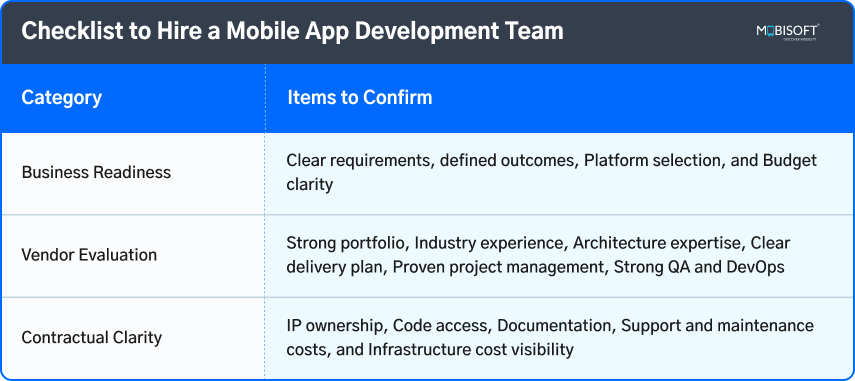
Conclusion: Choosing the Right Partner Sets the Foundation for Your Growth
We often see companies approach their mobile app as a technical box to check. This perspective can create real problems down the line. Think of your mobile app as a long-term business commitment. It demands careful planning and the right partner. A skilled mobile app development company becomes a catalyst for innovation. They help you craft superior customer experiences and establish a scalable foundation for your entire digital presence through reliable mobile app development services.
Making the wrong choice has consequences. Projects stall. You inherit messy code that requires constant fixes, which we call technical debt. Meanwhile, your competitors are capturing the audience you wanted.
The ideal team brings more than coding skills. They offer a holistic understanding of product strategy, intuitive design, and secure, maintainable architecture. When you find that group, you’re doing more than building a simple application. You are creating a lasting digital property supported by strong custom app development practices that will serve your business for the foreseeable future.
Key Takeaways
- It takes expense and effort in the years of care, updates, and patches that follow after a launch. If you only budget for the beginning, you're planning for a dead product.
- A great team argues with you about your features. They'll ask "why" until they uncover the real business problem.
- Everyone focuses on the interface. While the real work happens in the backend architecture. If that's not designed to scale and adapt, your entire app will eventually hit a wall.
- "Technical debt" is the price you pay for taking shortcuts. A sloppy foundation might get you to market faster, but the interest payments in constant bug fixes and rewrites will cripple your future progress.
- The choice between native and cross-platform isn't about what's better, but what's right for the job. Each aligns with different needs and budgets when you hire mobile app developers.
- Post-launch, you don't want a team that goes silent. You need one that sticks around to watch the analytics, handle the inevitable OS updates, and proactively suggest what to build next based on how people actually use the thing.
- And perhaps most importantly, you're not just buying a service. You're entering a long-term relationship. Clear communication and a shared vision matter just as much as the quality of the code itself.

FAQs
What long-term problem are we creating by choosing the cheaper development option today?
You might be building on a weak foundation. The initial savings can disappear into a black hole of future reworks, performance fixes, and a codebase that’s difficult to update. That initial cost difference often just gets paid later, with interest, in the form of technical debt and missed opportunities.
What does 'product thinking' actually feel like in a partnership?
You will know it when a developer questions a feature request because it doesn't align with your user data. They will be the ones suggesting a simpler way to achieve the same goal. It is a focus on solving problems effectively, not just on completing a task list for you.
How technical do our internal teams need to be?
You just need to be experts in your own business. A capable partner should handle the technical execution. Their real skill lies in translating your goals into a plan and then explaining the key parts in plain English, focusing on the 'why' behind decisions so you can make informed choices.
Where do budgets usually fall short?
They almost always miss the real cost of keeping an app alive. The initial build is just the entry fee. The real budget killer is the ongoing cloud hosting, payment gateway fees, and the constant, necessary updates for new OS versions. It's the stuff after launch that truly determines an app's lifespan.
A portfolio looks good, but how do we judge their design process?
Ask them to tell the story behind one of their portfolio pieces. Why did the navigation end up that way? What user feedback changed their initial design? Their answer will tell you far more about their skill than any polished screenshot ever could. You are listening to their reasoning.
What does a good post-launch relationship look like?
You should expect them to be proactive. They should be the ones alerting you to performance dips, managing necessary OS updates, and suggesting small improvements based on actual usage. It is the difference between a team that builds you something and a partner that helps it grow and succeed.

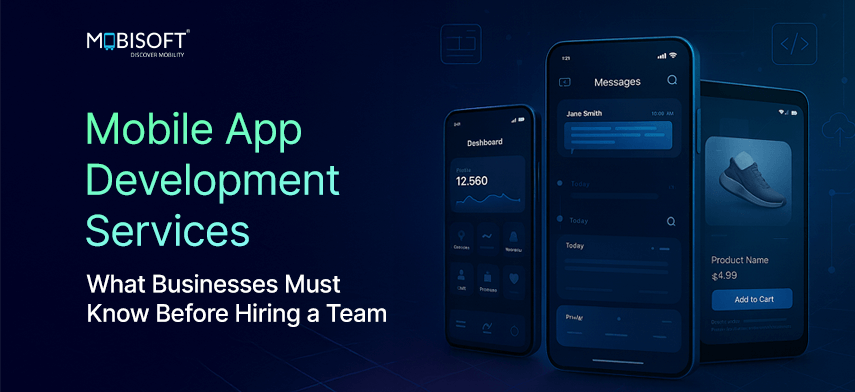


 November 28, 2025
November 28, 2025


